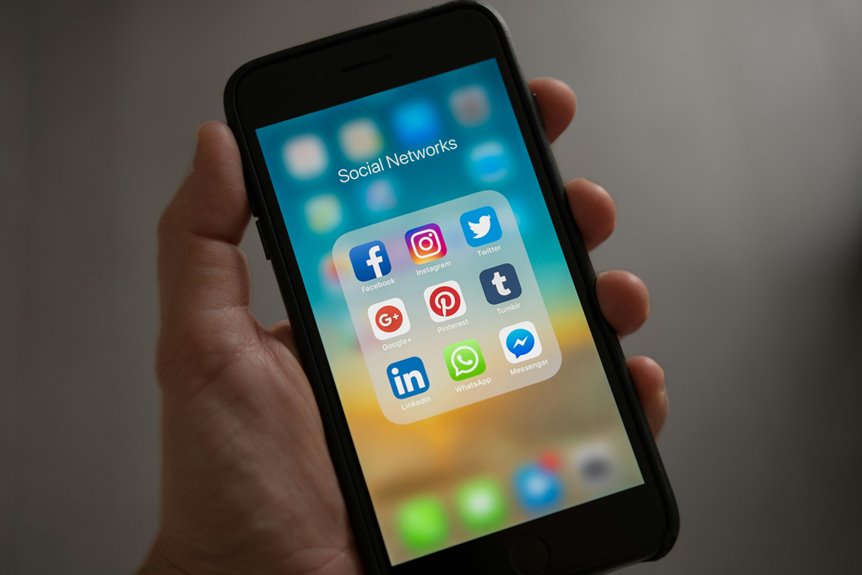To disable internet access for WhatsApp, users can modify settings on their devices.
For Android users, navigate to Settings, locate Mobile Network options, and restrict background data for WhatsApp.
Meanwhile, iPhone users should access Settings, select WhatsApp, and toggle off Cellular Data.
By doing this, users can prevent unnecessary updates and distractions, conserve battery life, and enhance their privacy.
Additionally, there are various strategies to further optimize app usage and manage data effectively, such as exploring Wi-Fi settings, utilizing airplane mode, and exploring Do Not Disturb features for a more focused experience.
Reasons to Disable Internet for WhatsApp
While staying connected is crucial, many users find that disabling internet access for WhatsApp can be beneficial for several reasons. It allows for improved data management by conserving mobile data, especially when the app isn't actively in use. This approach helps prevent unnecessary data consumption from continuous updates and frequent notifications, ultimately resulting in lower mobile bills. Moreover, users gain better control over notifications, leading to a reduction in alerts from carriers regarding data limits. By effectively managing background activities, individuals can enjoy a more mindful use of their devices while freeing themselves from constant digital distractions. Additionally, disabling internet access helps mitigate unnecessary data use that occurs even when the app is not actively in use.
Furthermore, disabling internet access can enhance mental well-being by allowing for periods of digital detox, fostering deeper focus on tasks at hand, and promoting healthier communication habits. This can lead to more meaningful interactions when users choose to re-engage with their WhatsApp messages in a more intentional manner. Ultimately, taking a break from constant connectivity can contribute to a more balanced digital lifestyle.
Steps to Disable Internet for WhatsApp on Android
To effectively disable internet access for WhatsApp on your Android device, you'll need to navigate through your device settings to manage data usage. This involves a few key steps: first, you should toggle off data permissions specifically for WhatsApp, which prevents the app from using mobile data or Wi-Fi. Additionally, it is essential to disable background activity for WhatsApp, ensuring that the app does not consume data when you are not actively using it. By following these simple steps, you can gain better control over when and how WhatsApp connects to the internet, allowing you to manage your data usage more efficiently. This approach can help you maintain privacy while still using other apps that require an internet connection. By limiting your WhatsApp checks to 1-3 times a day, you can also enhance your focus on important tasks.
Accessing Device Settings
Accessing device settings to disable internet access for WhatsApp on Android is a straightforward process that can be accomplished in just a few simple steps. Here's an expanded guide to help you navigate this effectively:
1. Open the Settings App****: Begin by locating and tapping on the Settings app icon on your Android device's home screen or app drawer.
2. Locate Mobile Network Options****: Once in the Settings menu, scroll down to find options labeled "Mobile Network," "Network & Internet," or something similar. Note that the exact wording may vary depending on the brand and model of your device.
3. Specific Instructions for Device Brands:
- For Xiaomi Users: Navigate to "Connection & Sharing," where you can find options related to data usage.
- For OnePlus Users: Look for "Mobile Network" settings, which will allow you to access data management features.
- For Samsung Users: Go to "Connections" and then select "Data Usage" to manage app-specific data access.
4. Manage Data Usage: After accessing the relevant section, find "Data Usage," "Data Traffic Management," or a similar option. Here, you can see a list of apps that use mobile data.
5. Select WhatsApp: Scroll through the list and select WhatsApp. You will then have the option to restrict background data or completely disable mobile data access for the app. Using the Connection Method option in App Info/settings can also disable internet access for WhatsApp.
6. Confirm Settings: Make sure to save or confirm any changes you make to ensure that WhatsApp is only allowed to connect to the internet when you want it to.
Managing Data Usage
Managing data usage effectively is crucial for users who want to limit WhatsApp's internet access on their Android devices. Users can start by accessing the data usage settings on their devices, where they'll find various options for monitoring and managing data consumption. Identifying WhatsApp's data usage is essential, as it reveals how much data the app consumes for real-time updates and notifications, which can often lead to draining mobile data packages quickly. By disabling background data for WhatsApp, users can optimize the app's performance and conserve precious data resources.
Additionally, setting alerts for high data usage can help users stay informed about their consumption levels. Focusing on in-app conversations and minimizing media downloads can further aid in managing data efficiently. These strategies not only contribute to a significant reduction in overall data consumption but also help users minimize distractions, allowing them to enjoy greater control and freedom over their mobile experience. Exploring these options can empower users to make informed decisions about their data usage, ultimately enhancing their overall mobile experience.
Disabling Background Activity
Limiting WhatsApp's internet access can significantly enhance data management on Android devices. Disabling background activity not only optimizes the app's performance but also conserves valuable resources. To effectively manage WhatsApp's background activity, users can follow these detailed steps:
- Access Settings: Begin by navigating to the device's Settings menu, where various options for customization are available.
- Find Apps: Scroll down and select the "Apps" option to find the list of installed applications on your Android device.
- Select WhatsApp: Locate WhatsApp in the list of applications and tap on it to open the app settings.
- Battery or Data Usage: Within the WhatsApp settings, look for either the "Battery" or "Data Usage" section, depending on your device's configuration.
- Disable Background Activity: Toggle off the option labeled "Allow background activity" to prevent WhatsApp from using data when not actively in use.
- Developer Options: For advanced users, accessing Developer options can help in stopping unwanted services that may be running in the background.
- Manage Network Settings: Go to the network settings of your device and uncheck the options for data and Wi-Fi access specifically for WhatsApp.
Steps to Disable Internet for Whatsapp on Iphone
To disable internet access for WhatsApp on an iPhone, users can follow a few straightforward steps in the device's settings. Initially, open the Settings app and scroll to find WhatsApp. Toggle off the switch next to WhatsApp under Cellular Data to impose WhatsApp restrictions. For further internet blocking, disable Background App Refresh as well. Additionally, users can set up a proxy within WhatsApp by entering a random IP address to block connections effectively. Alternatively, you can utilize the Shortcuts app to automate Wi-Fi toggling each time WhatsApp opens, granting you flexible control over internet access without affecting other apps. This approach not only helps limit distractions but also ensures that your focus remains undisturbed while using your iPhone.
Advantages of Restricting Internet Access
Restricting internet access for applications such as WhatsApp presents a variety of advantages, including reduced data consumption and enhanced battery longevity. Users can experience increased privacy control, thereby decreasing the likelihood of unauthorized data sharing. Overall, these benefits lead to a more streamlined and secure mobile experience, allowing users to enjoy their devices without the constant drain of resources and the looming threat of privacy breaches.
Lower Data Usage
While many users appreciate the convenience of WhatsApp for messaging, the app's background data usage can quickly add up, leading to increased mobile bills. By disabling internet access for WhatsApp, users can effectively manage their mobile data. Some advantages include:
- Stopping unnecessary updates and notifications
- Cutting data costs for frequent travelers
- Prolonging the validity of limited data plans
- Avoiding stress from carrier notifications
- Saving money on additional fees
Improved Battery Life
Managing data usage not only helps cut costs but can also significantly enhance battery life. By restricting internet access for apps like WhatsApp, users can effectively minimize background activity, which is often a major drain on battery power. This optimization of battery performance reduces unnecessary updates and notifications, allowing devices to function more efficiently and last longer. With fewer tasks running in the background, the load on the processor decreases, which in turn enhances the overall performance of applications. Furthermore, users can identify and address problematic apps that may be causing excessive battery drain, leading to more efficient management of device resources. Ultimately, disabling internet access for WhatsApp can play a crucial role in achieving a more stable and enduring battery life.
To expand on this topic, one might consider exploring these queries:
- What are the best practices for managing app data usage to improve battery life?
- How does background activity impact battery consumption on smartphones?
- What specific settings can be adjusted in WhatsApp to conserve battery life?
- Are there alternative messaging apps that are more energy-efficient than WhatsApp?
- How can users monitor and track battery usage over time to identify issues?
- What role does app optimization play in enhancing battery longevity?
- How do different smartphone models compare in terms of battery performance with similar app usage?
- What are the long-term effects of excessive background activity on smartphone battery health?
Enhanced Privacy Control
When users limit WhatsApp's internet access, they gain significant control over their privacy and data security. This restriction enhances user experiences by effectively addressing privacy concerns. Key advantages include:
- Reduced Background Data Consumption: By limiting internet access, users can minimize the amount of data transmitted in the background, which helps to decrease exposure to external parties who may be tracking or collecting data.
- Minimized Unauthorized Messaging: Users can prevent unwanted notifications and interruptions from unauthorized messaging, leading to a more streamlined communication experience.
- Decreased Data-Driven Ad Targeting: By restricting internet access, users can limit the use of their personal information for targeted advertising, enhancing their overall privacy.
- Improved Security Against Hackers: Limiting internet connectivity can bolster security measures, reducing the risk of unauthorized access to personal accounts and information by potential hackers.
- Compliance with Local Data Laws: Ensuring that personal data processing aligns with local regulations helps safeguard users' rights and fosters trust in data handling practices.
Impact on WhatsApp Usage
Turning off internet access for WhatsApp significantly impacts user engagement with the platform. Users can still utilize WhatsApp features on web and desktop through the multi-device beta access, which facilitates offline chats and calls. This shift enhances the overall user experience by providing greater flexibility, although it may lead to some operational challenges. Additionally, disabling background data assists in managing data consumption, making it easier for users to oversee their data packages. Proxy servers can serve as a solution during outages, ensuring that communication remains uninterrupted while also safeguarding privacy. Overall, restricting internet access fundamentally changes how users interact with WhatsApp, blending convenience with deliberate communication strategies.
Turning off internet access for WhatsApp transforms user engagement, blending flexibility with strategic communication in offline settings.
To explore this topic further, consider the following queries:
- How does disabling internet access affect user behavior on messaging platforms like WhatsApp?
- What are the operational challenges users face when using WhatsApp offline?
- In what ways do proxy servers enhance communication during internet outages?
- How can users effectively manage their data consumption on WhatsApp?
- What are the benefits and drawbacks of using multi-device access for WhatsApp?
- How does offline access influence the overall user experience on WhatsApp?
- What strategies can users employ to maintain privacy while using WhatsApp in restricted internet conditions?
Effectiveness and Limitations of Internet Restrictions
While internet restrictions can enhance productivity and streamline data management, organizations must also be aware of the significant limitations that accompany these measures. Although such restrictions can foster improved focus and bolster cybersecurity, they may inadvertently lead to several adverse effects:
- An increased reliance on alternative communication tools that may not be monitored
- Restricted access during critical situations that necessitate immediate communication
- Users finding ways to bypass restrictions through VPNs or other means
- A reliance on expensive technological solutions to enforce these restrictions
- Potential declines in employee morale and a sense of autonomy
It's essential for organizations to strike a balance between implementing an effective internet policy and allowing flexibility in communication tools. This balance is key to fostering a positive work environment. Therefore, organizations should carefully evaluate these considerations before instituting stringent internet restrictions.





